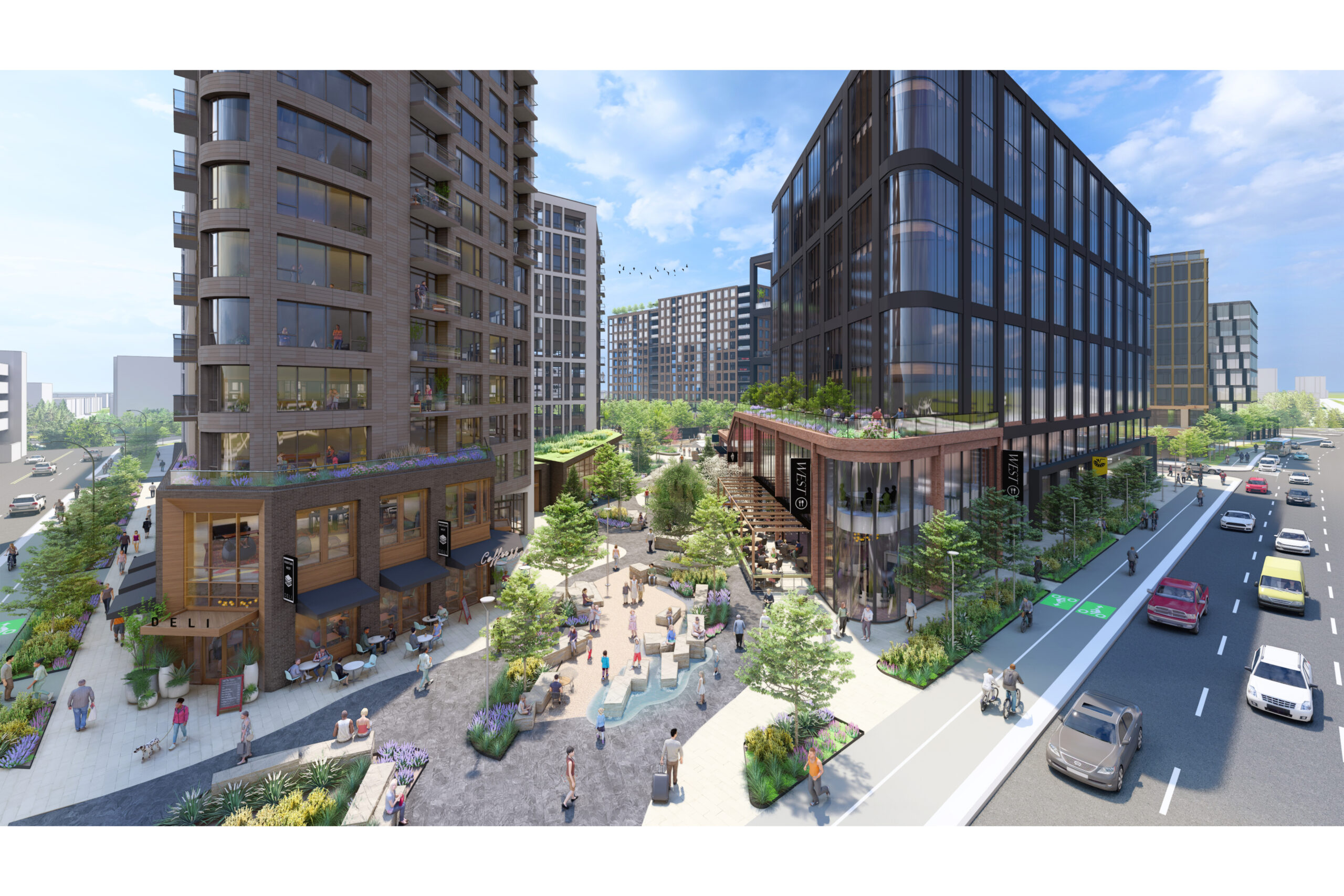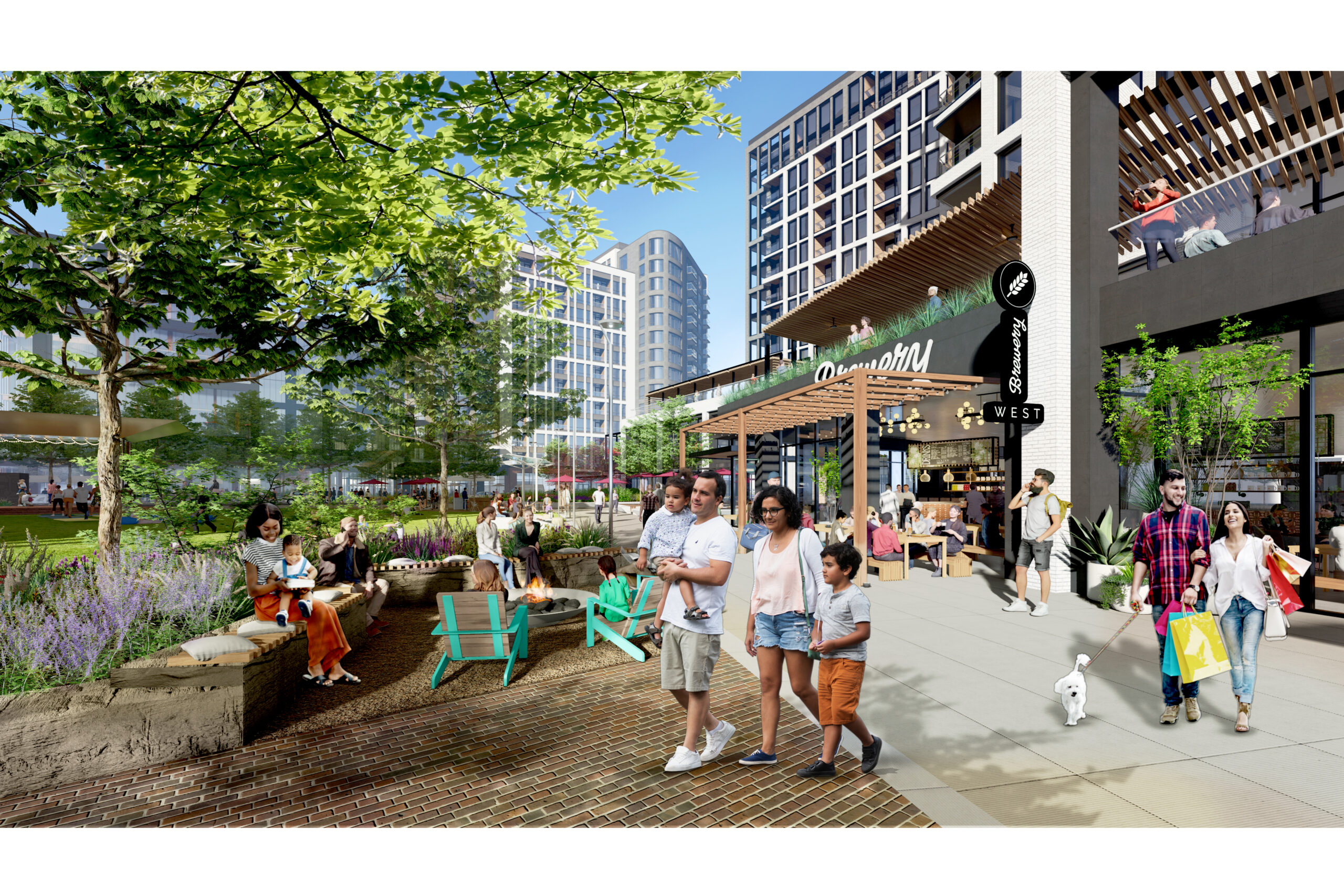
A rendering of the Cherry Creek West project. (Courtesy East West Partners)
Developer East West Partners’ plans to redevelop the 13-acre west end of the Cherry Creek Shopping Center cleared their primary hurdle Monday evening.
The Denver City Council voted unanimously, with two members absent, in favor of rezoning the property at the corner of 1st Avenue and University Boulevard, as well as to approve a development agreement that includes commitments on items such as the inclusion of income-restricted housing.
While the individual buildings within the project will still need to receive various city approvals, Monday’s vote allows Denver-based East West to start work on a project that it first announced in November 2021.
Seven buildings are currently planned. While specifics could change, four of the buildings are expected to be residential, with about 825 units between them. The remaining three buildings would have about 600,000 square feet of office space combined. The project would also incorporate retail space. The tallest buildings would be 13 stories.

Amy Cara, a managing partner at East West. Photo courtesy of East West.
“We want this to be a model of a 15-minute community, where you don’t have to rely on a car for every trip,” East West Managing Partner Amy Cara told council members Monday.
Some internal road and utility work will begin at the site toward the end of this year, according to East West, with demolition of existing buildings expected to begin next spring. The project is expected to be built in two phases in the next decade. Buildings within the first phase, on the east end of the site, will break ground in summer 2026 and be completed three years later.
Cara said East West plans to develop all the buildings itself. The company struck a ground lease deal in 2021 with the Buell Foundation, which owns the land where the mall sits. It was designed to go into effect upon approval of the rezoning, Cara said.
Michigan-based Taubman owns the mall and has a separate ground lease agreement. The west end, which has had a big-box retail format, has been largely vacant for years. One holdout tenant, the steakhouse Elway’s, closed at the end of August, although East West hopes it could return to the project when space is completed.

A rendering of the Cherry Creek West project. (Courtesy East West Partners)
In her comments to council, Cara highlighted that the firm has agreed to reserve 12 percent of apartments constructed on the site to those making up to 60 percent of the area median income, “which targets workers in this restaurant and retail centric district who can’t afford to live here today.”
The income-restricted units will be spread throughout the buildings, and East West does not plan to seek low-income housing tax credits, which are in high demand.
Councilwoman Amanda Sawyer, who represents the area, recalled running by the site in 2014 on a trip to Denver and thinking it was “wholly underutilized.” She said she was glad East West’s plans do not involve a metro district, which allows a developer to front the money for infrastructure and be paid back by future residents and tenants.
“It is incredibly important that your financing is in place — that you are not passing along costs to figure tenants that are unnecessary and will make this unaffordable in the end even if it looks affordable now,” Sawyer said.
Councilwoman Amanda Sandoval noted that East West also developed the Riverfront Park neighborhood behind Union Station, which is in her council district.
“You do a great job. I love the project … I get compliments on it all the time. You’ve been a great partner,” Sandoval said of Riverfront Park.

A rendering of the Cherry Creek West project. (Courtesy East West Partners)
Developer East West Partners’ plans to redevelop the 13-acre west end of the Cherry Creek Shopping Center cleared their primary hurdle Monday evening.
The Denver City Council voted unanimously, with two members absent, in favor of rezoning the property at the corner of 1st Avenue and University Boulevard, as well as to approve a development agreement that includes commitments on items such as the inclusion of income-restricted housing.
While the individual buildings within the project will still need to receive various city approvals, Monday’s vote allows Denver-based East West to start work on a project that it first announced in November 2021.
Seven buildings are currently planned. While specifics could change, four of the buildings are expected to be residential, with about 825 units between them. The remaining three buildings would have about 600,000 square feet of office space combined. The project would also incorporate retail space. The tallest buildings would be 13 stories.

Amy Cara, a managing partner at East West. Photo courtesy of East West.
“We want this to be a model of a 15-minute community, where you don’t have to rely on a car for every trip,” East West Managing Partner Amy Cara told council members Monday.
Some internal road and utility work will begin at the site toward the end of this year, according to East West, with demolition of existing buildings expected to begin next spring. The project is expected to be built in two phases in the next decade. Buildings within the first phase, on the east end of the site, will break ground in summer 2026 and be completed three years later.
Cara said East West plans to develop all the buildings itself. The company struck a ground lease deal in 2021 with the Buell Foundation, which owns the land where the mall sits. It was designed to go into effect upon approval of the rezoning, Cara said.
Michigan-based Taubman owns the mall and has a separate ground lease agreement. The west end, which has had a big-box retail format, has been largely vacant for years. One holdout tenant, the steakhouse Elway’s, closed at the end of August, although East West hopes it could return to the project when space is completed.

A rendering of the Cherry Creek West project. (Courtesy East West Partners)
In her comments to council, Cara highlighted that the firm has agreed to reserve 12 percent of apartments constructed on the site to those making up to 60 percent of the area median income, “which targets workers in this restaurant and retail centric district who can’t afford to live here today.”
The income-restricted units will be spread throughout the buildings, and East West does not plan to seek low-income housing tax credits, which are in high demand.
Councilwoman Amanda Sawyer, who represents the area, recalled running by the site in 2014 on a trip to Denver and thinking it was “wholly underutilized.” She said she was glad East West’s plans do not involve a metro district, which allows a developer to front the money for infrastructure and be paid back by future residents and tenants.
“It is incredibly important that your financing is in place — that you are not passing along costs to figure tenants that are unnecessary and will make this unaffordable in the end even if it looks affordable now,” Sawyer said.
Councilwoman Amanda Sandoval noted that East West also developed the Riverfront Park neighborhood behind Union Station, which is in her council district.
“You do a great job. I love the project … I get compliments on it all the time. You’ve been a great partner,” Sandoval said of Riverfront Park.


